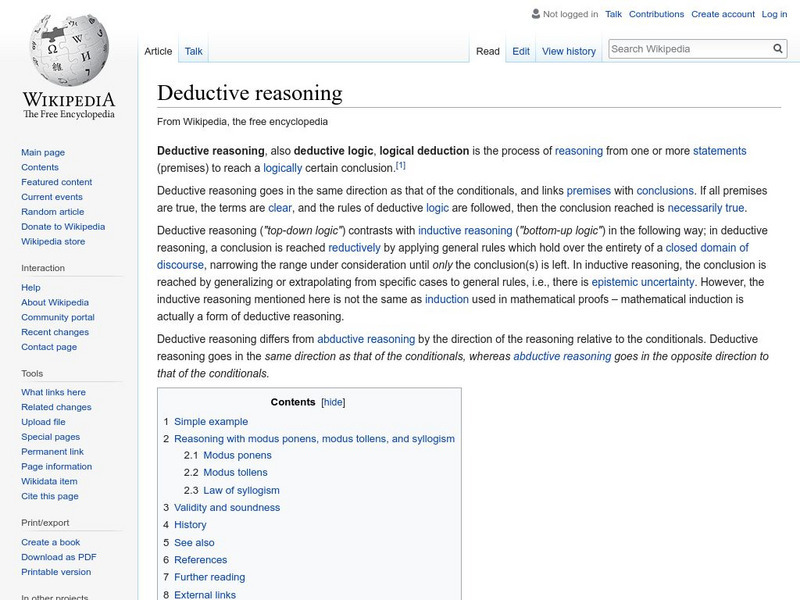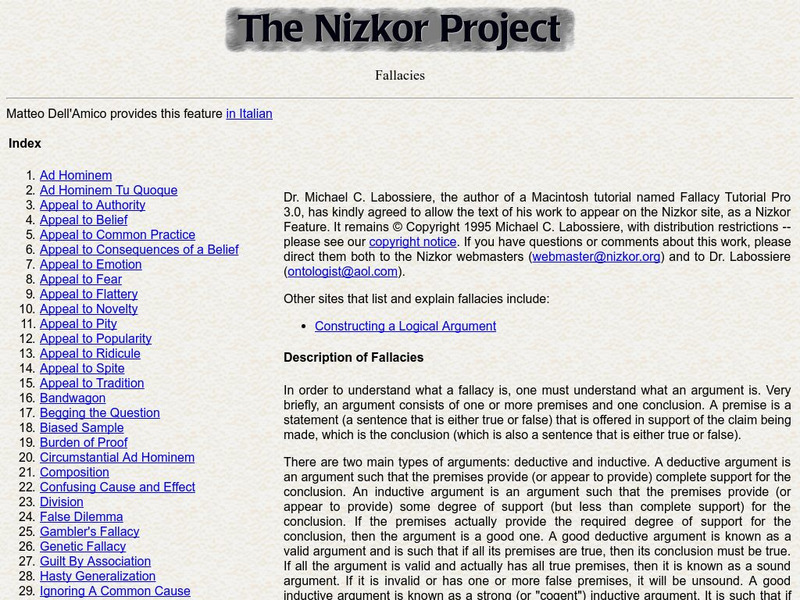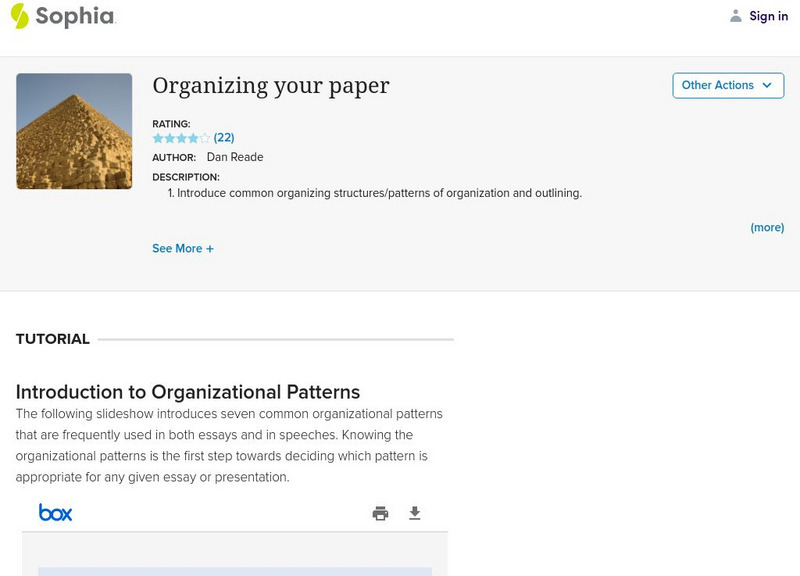Other
International Debate Education Association: Debates: Politics
A selection of debate topics focused on political themes. Each topic includes a clear statement of the argument, a list of points for and against, suggested support for each (point and counterpoint), and a bibliography that supports the...
University of North Carolina
University of North Carolina: Writing Center: Handouts: Evidence
What kinds of evidence best support the points you make in a paper? Where can you find the evidence you need? This handout answers all these questions and more, including the difference between primary and secondary sources. You'll also...
Harvard University
Harvard University: Strategies for Essay Writing
This website provides a series of links to detailed information about each segment of how to write an academic essay from how to read the assignment to the final edits. Use the links to the right. W.9-10.1a claims/intro/org, W.9-10.2a...
Texas Education Agency
Texas Gateway: Revising the Persuasive Essay: Counterarguments Based on Evidence
[Accessible by TX Educators. Free Registration/Login Required] You will learn strategies for evaluating and revising counter-arguments that anticipate objections in an essay.
Texas Education Agency
Texas Gateway: Differentiate Among Empirical, Anecdotal, and Logical Evidence
[Accessible by TX Educators. Free Registration/Login Required] In this lesson, students will learn about three types of evidence that writers often rely on: logical, empirical, and anecdotal. It will also help you distinguish among these...
Texas Education Agency
Texas Gateway: Distinguishing Between Inductive and Deductive Reasoning
This lesson focuses on distinguishing between inductive and deductive reasoning. Sometimes it's difficult to separate these two types of reasoning because we often use them together; drawing conclusions in inductive reasoning is likely...
Texas Education Agency
Texas Gateway: Drawing Conclusions on the Sufficiency and Strength of Research
The activities in this lesson will help you focus on the important features of arguments, especially on the writer (or the source) and the evidence the writer provides. That way, you can more accurately decide if an argument is valid and...
Georgia Department of Education
Ga Virtual Learning: Logical Fallacies List: Arguments to Avoid [Pdf]
This is a multi-page PDF list of logical fallacies to avoid when writing. These include a detailed list includes fallacies in relevance, reasoning, omission, and ambiguity; and discusses the logic tool "Occam's Razor." This list of...
Texas Education Agency
Texas Gateway: Analyze the Relevance, Quality, and Credibility of Evidence
[Accessible by TX Educators. Free Registration/Login Required] In this lesson, students will learn to analyze the quality, relevance, and credibility of evidence used to support an argument.
Online Writing Lab at Purdue University
Purdue University Owl: Logic in Argumentative Writing
Provides a detailed explanation of the fundamentals of logic, including brief definitions of key terms and sections on fallacies and improprieties, as well as examples and practice exercises. Click on additional subtopics in the side...
Texas Education Agency
Texas Gateway: Differentiate Among Empirical, Anecdotal, and Logical Evidence
[Accessible by TX Educators. Free Registration/Login Required] This lesson will help you distinguish among three kinds of evidence: logical, empirical, and anecdotal; and see how they are used to support conclusions and arguments in texts.
Smithsonian Institution
National Museum of Natural History: Structuralism Basic Premises
Excellent source for structuralism and its tenets and premises. Provides key works, methodologies, and criticisms. Thorough website.
Wikimedia
Wikipedia: Deductive Reasoning
This free encyclopedia site from Wikipedia gives a definition and examples of deductive reasoning. It also has links to related terms and topics.
Web Center for Social Research Methods
Research Methods Knowledge Base: Deduction and Induction
This site provides a good explanation of deductive and inductive thinking.
Other
Fallacy Files: Begging the Question
Discusses the error in logic behind the fallacy of Begging the Question (also known as Circular Argument, Circular Reasoning, Circulus in Probando, Petitio Principii, or Vicious Circle). Although a great deal of information about the...
Other
Fallacy Files: Bandwagon Fallacy
Clear explanation of the flaw in logic known as Bandwagon Fallacy (also known as Appeal to Popularity, Bandwagon Appeal, Argument by Consensus, Argumentum ad Populum, or Authority of the Many). Along with a definition, example, and...
Other
The Nizkor Project: Fallacies
The Nizkor Project: Fallacies is a text provides an explaination of fallaces. It identifies the specific kinds of fallacies as well as gives a couple of examples.
Austin Independent School District
Austin Independent School District: Logical Fallacies [Pdf]
A slide show explaining different types of fallacies in persuasive texts including personal attack, bandwagon, appeal to authority, and many more. Then try to find the fallacy in several examples; answers and explanations provided.
Other
Style: Cause and Effect Writing
This site provides a list of what to do and not do for writing cause and effect essays. It also contains an evaluation checklist at the end which students can use for their own writing.
Grammarly
Grammarly Handbook: Methods of Reasoning
A list (with examples) of common errors in logic including the following: non sequiturs, hasty generalization circular argument, ad hominem, ad populum, and red herring.
Sophia Learning
Sophia: Organizing Your Paper
Two slideshows and a screencast on organizational patterns used when writing essays and speeches. The first is a 20-slide presentation explaining the seven most common organizational patterns used in writing: time sequence, spatial,...
ReadWriteThink
Read Write Think: Sequence of Events Chart
A printable graphic organizer to help students sequence events and recognize cause and effect relationships within a story. Directions on how to use this graphic organizer as well as lists of teaching ideas and related resources are also...
University of North Carolina
University of North Carolina: The Writing Center: Fallacies
Discussion of common fallacies, along with definitions, examples, and tips on avoiding them.
Lumen Learning
Lumen: Boundless Communications: Logical Appeals
This lesson plan focuses on using logical appeals in persuasive speeches including inductive and deductive reasoning, inductive reasoning and associative reasoning, forming a rational appeal, and errors in reasoning-formal and informal.




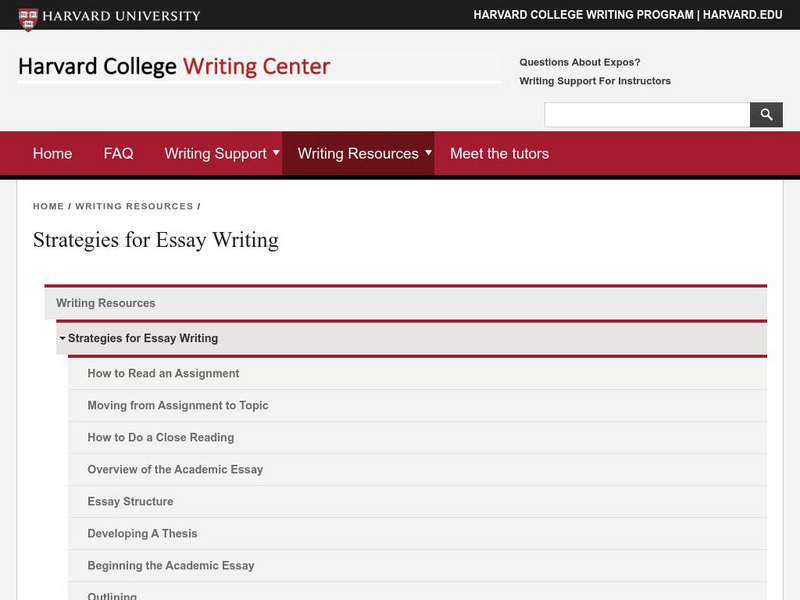



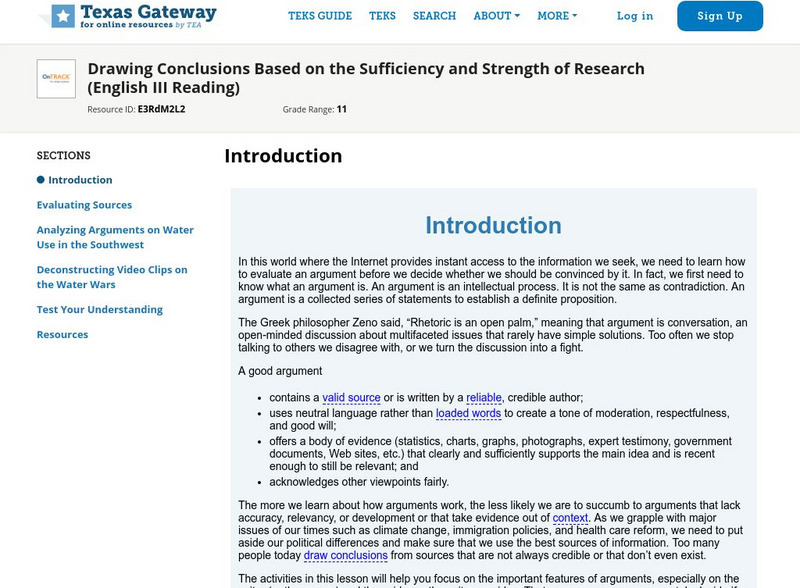
![Ga Virtual Learning: Logical Fallacies List: Arguments to Avoid [Pdf] Primary Ga Virtual Learning: Logical Fallacies List: Arguments to Avoid [Pdf] Primary](https://d15y2dacu3jp90.cloudfront.net/images/attachment_defaults/resource/large/FPO-knovation.png)



